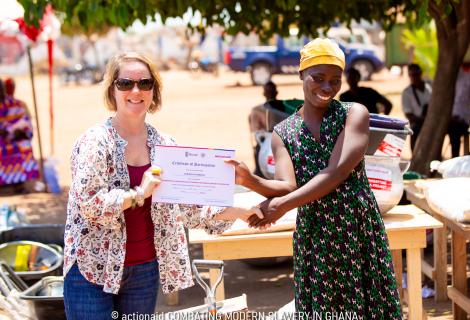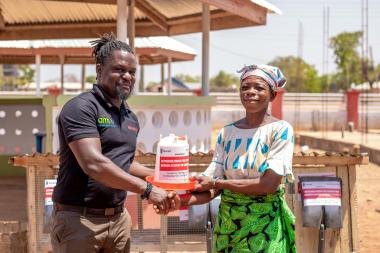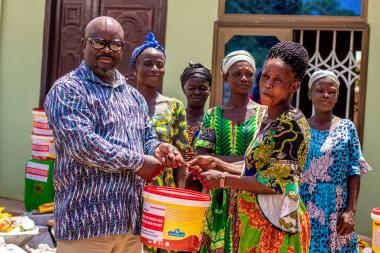ActionAid supports 400 female household heads with livelihood startups tools

Modern slavery in various forms are depriving many people, especially women and children, of their fundamental rights and freedoms. The International Labour Organisation (ILO) estimates that almost 50 million people, or one in every 150 worldwide, are in situations of modern slavery. Out of the 50 million, more than 3.3 million are children. According to the ILO, the number of people in slavery increased by 2.7 million between 2016 and 2021. The growth has been attributed to the onset of the COVID-19 pandemic. An increase in extreme poverty since the pandemic has contributed to the rise in modern slavery, with the private economy being the main source of the rise. “COVID-19 led to escalated individual debt, resulting in more people being vulnerable to exploitation.”, the ILO adds.
Samuel Sabuli, Project Manager, ActionAid Ghana handing over a startup material to a project beneficiary.
In Ghana, Modern slavery is quite common and manifesting itself vividly in the forms of exploitation of children and women labour, especially within the agricultural sector. Centuries on from the abolition of slavery in major economies worldwide, enforced labour is still a huge problem.
To address these human rights abuses, ActionAid Ghana and Ethiopia have been implementing the Combatting Modern Slavery project with funding support from the Norwegian Agency for Development Corporation (Norad).
The project has since its inception in 2021 built the capacities of state institutions to implement measures to prevent, identify and protect vulnerable groups and victims of modern slavery. Businesses have also been engaged and trained to implement anti-modern slavery measures to prevent, identify and tackle the use of human trafficking and forced labour, including the worst forms of child labour, in their own operations and supply chains.
Micheal Nsiah, General Assembly Member, ActionAid Ghana handing over a startup tool to a project beneficiary.
At the community level, the project has supported vulnerable individuals and groups by building their capacity to resist and seek redress for their recruitment into modern slavery. Through ActionAid’s community structures such as the Anti-Modern Slavery Committee and in partnership with the Anti-Human Trafficking Unit of the Ghana Police Service, 45 survivors of trafficking have been rescued.
Distribution of Livelihood Startups
John Nkaw, Country Director, ActionAid Ghana handing over startup tool to a project beneficiary.
In August 2022, ActionAid Ghana commissioned the Ghana Enterprises Agency to train four hundred female -household heads to overcome their vulnerability of being recruited into modern slavery practices. The Alternative Livelihood training was conducted to equip the beneficiaries to acquire livelihood skills and increase their income levels by starting their own business or gaining employment. The training was conducted in areas such as detergent production, animal rearing, catering, beekeeping, mushroom farming and baking. The others are soap making, pomade production, vegetable farming, tiling, bead making and make-up. As part of the training activity, participants were provided with startup materials and tools to drive their businesses, improve their economic power and meet the basic needs of their dependents. The tools which include sterilisers, hand gloves, napkins and many others were purchased at a total cost of one million, nine hundred and ninety-four thousand, three hundred and six.
Beneficiaries were selected across twelve districts in four (4) regions namely; (Sissala East, Wa East, Lawra, Kadjebi, Jasikan, Nkwanta South, East Gonja, Kpandai, Nanumba South, Jaman North, Jaman South and Tain) in the Upper west, Northern, Oti and Bono regions respectively.
Speaking at the handing over ceremony in Sampa in the Ahafo region, John Nkaw, Country Director, ActionAid Ghana said, “the provision of livelihood interventions for women is at the heart of ActionAid’s work. We believe that households that have alternative livelihoods can be empowered to live a dignified life and resist indecent work, violence, exploitation, harassment, and abuse within workspaces.”
Hon. Solomon Owusu, DCE, Jaman North District Assembly handing over a startup material to a project beneficiary.
Hon. Solomon Owusu, District Chief Executive, Jaman North District Assembly, noted that the fight against modern slavery practices requires the collective efforts of government, institutions and members of the communities.
“The community has a role to play in the fight against modern slavery by reporting suspicious human rights infringement, and activities, supporting victims and raising awareness among themselves.”, he said.
In her remarks, Asmara Figue, Project Manager, ActionAid International said, “The fact that forms of slavery not only persist in today’s world, but are estimated to be on the increase, due to multiple crises such as conflict, climate change and unfair economic systems is one of the greatest injustices we face.”
Micheal Fredrick Ssenoga, M&E Officer, ActionAid International handing over a startup tool to a project beneficiary.
At a similar ceremony in Wa in the Upper West region, Justine Bayor, Head of Programmes, Campaign and Innovation, ActionAid Ghana noted that human trafficking for purposes of forced labour and servitude is on the rise due to the lucrative nature of these illegal activities.
He revealed that the livelihood startup support to the selected women is to assist rural women from being recruited into modern slavery practices.
Jacob Dery, Municipal Chief Executive, Lawra, Upper West said the distribution of the livelihood startup was a manifestation of ActionAid’s commitment to supporting rural women, calling on the beneficiaries to utilise the tools to improve their income levels and general well-being of their household.
Jacob Dery, Municipal Chief Executive, Lawra, Upper West handing over a startup material to a project beneficiary.
Micheal Fredrick Ssenoga, Monitoring, Evaluation, Learning and Research, ActionAid International opined that young women and girls are the most vulnerable to modern slavery practices, stressing that ActionAid will continue to do its best to build the resilience of communities to resist all forms of modern slavery.
Across the world, ActionAid is working in partnership with like-minded organisations, communities and government agencies towards a world free from poverty and injustice. As a social justice organisation, ActionAid is also working to see a just, fair and sustainable world, in which everybody enjoys the right to a life of dignity, and freedom from poverty and oppression.

